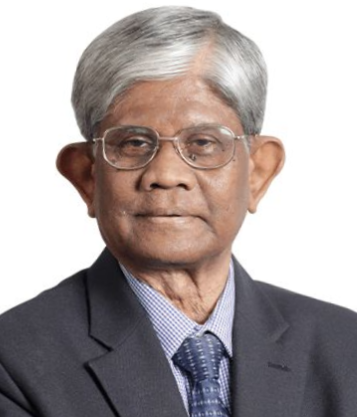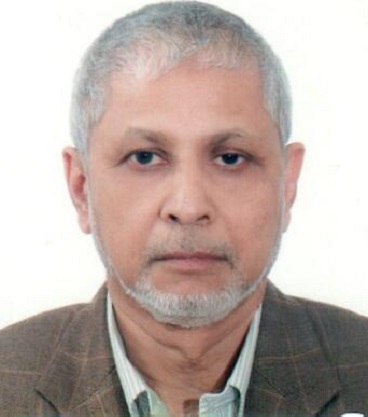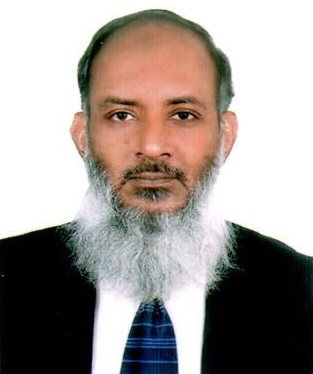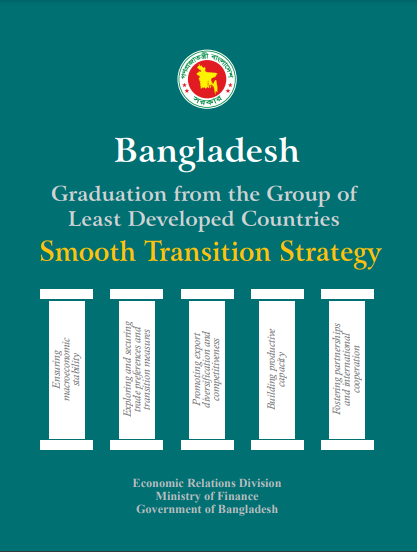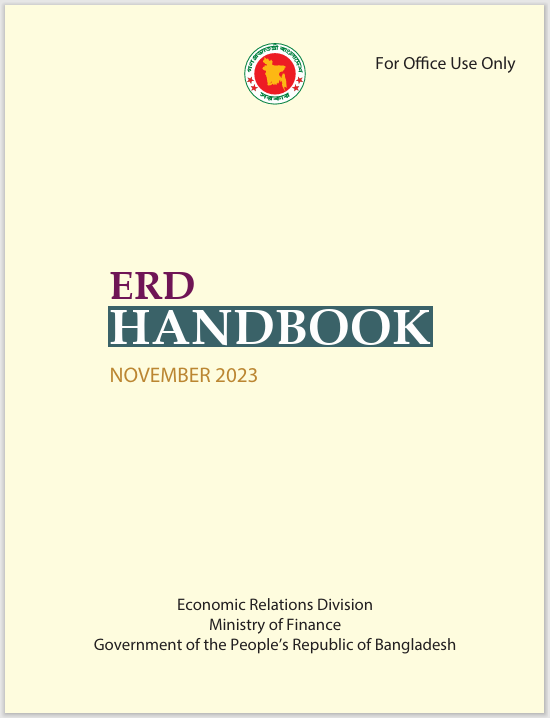Wing-1:America & Japan Functions
Wing-1 of ERD is headed by an Additional Secretary. He has to supervise the following two branches: (1) America Branch and (2) Japan Branch
The wing is mainly responsible for Aid coordination and resource mobilization from three major bilateral development partners of Bangladesh namely Japan, USA and Canada. In addition, the wing is responsible for dealing with issues relating to external economic policies.
Till date, Japan is the single largest bi-lateral development partner of Bangladesh. Japanese Assistance to Bangladesh encompasses wide range of cooperation in Power, Transportation, Telecommunication, Agriculture, Health, Education, Infrastructure, Water & Sanitation, Environment, Human Resource Development and in other sectors in the form of loan, grant, technical assistance, development studies, dispatching of volunteers, experts etc. Japanese loans are very soft term in nature carrying an interest rate of 0.0 I % and repayment period of forty year's including a grace period of ten years.
The United States of America (USA) through the USAlD has assisted Bangladesh since its independence. Its assistance spans a wide area covering agriculture, food, infrastructure development, health, education, environment, private sector development, sustainable energy and scientific research areas. Assistance from USA is provided in the form of grants. Moreover, United States Department of Agriculture (USDA) provides commodity aid to Bangladesh under the Public Law 480.
Canada as one of the major bilateral development partners in Bangladesh has been providing support to Bangladesh in achieving its development goals ever since its independence in 1971. Canadian Department of Foreign Affairs, Trade and Development (DFATD), the leading agency for managing Canadian Aid in Bangladesh, provides technical assistance in the form of grant. Its agreed priority areas of intervention are education, health, governance, environment and private sector development. The Government of Canada also supports development research activities in Bangladesh through the Canadian International Development Research Centre (lDRC).
Branch: Japan
The Japan Branch is headed by a Joint Secretary (Japan) who looks after Japan-1 Section and Japan-4 Branch. Some of the major work responsibilities of respective sections are as follows:
Work responsibilities:
Japan- 1 Section
1. Japanese ODA Loan issues are dealt with at the Section:
a) Process Project Proposals for Japanese ODA Loans received from Executing ministries/Divisions.
b) Finalize projects for ODA loans in consultation with JICA and relevant Ministry/Division and Agencies.
c) Process works related to agreements i.e. Minutes of Discussion, Pledge, Exchange of Notes, Note Verbale, Loan Agreement, Project memorandum, etc.
d) Functions related to various Japanese Missions i.e. Project Formulation Mission, Fact-finding Mission, Appraisal Mission and other Missions related to ODA Loans.
2. Participation in the Country Assistance Strategy (CAS) Program jointly organized by Japan, WB, ADB and DFID.
3. Arrange Portfolio Review Meetings with Ministries/Divisions/ Agencies and JICA to review the status of the on-going ODA loan projects.
4. Preparing Briefs/ Talking Points on Japanese ODA Loan related issues.
Section: Japan-2 Branch
1. Scrutinizing and processing of project proposals receive from Executing Ministries/Divisions for Japanese Grants (including Cultural Grant). Technical Cooperation and Development Studies;
2. Works related to signing Exchange of Notes, Note verbal, Minutes of Meeting (M/M), Minutes of discussion (M/D) and Scope of Work regarding Japan’s Grant Aid and Technical Assistance to Bangladesh;
3. Arrange Quarterly Monitoring Meeting for Grant Assisted projects;
4. Correspond other Ministries, Divisions and Government entities in connection with the validity of work and stay of Japanese Experts, Advisors and Volunteers in Bangladesh;
5. Monitoring and evaluation of Japanese Grant Aid and Technical Assistance Projects;
6. Facilitate Japanese Experts, Advisors and Volunteers avail the benefits and privileges accepted under bilateral Agreements.
Section: Japan-3
1. Processing proposals for Japanese Debt Relief Grant Assistance-Counterpart Fund (DRGA-CF)
2. Works related with JDCF allocation to different projects
3. Monitor performance of JDCF utilization in different projects
4. Deals issues related with JOCV Volunteers
Japan- 4 Branch
1. Obtaining Clearance for Japanese Experts/JICA staff from concerned administrative ministries/divisions and from M/o Home Affairs and M/o Foreign Affairs.
2. Processing JICA Proposed training Programs.
3. Clearances and Privileges of JICA Bangladesh officials.
4. Japan Human Resources Development Scholarship (JDS) Project.
Japanease ODA Loan Procedure is shwon in the following diagram:

Branch: America
AMERICA Branch is mainly responsible for the supervision of all bilateral activities related to aid mobilization and coordination between the countries of North America namely USA and Canada and Bangladesh. It consists of two sections (1) America-1 Section responsible for USA and other countries of North and South America (Except Canada) and (2) America-2 Section responsible for the CANADA.
America-1 Section: USA
The Government of the United States of America considers Bangladesh as a focus country for its development assistance. Among bilateral development partners, USA is one of the largest development partners in terms of volume of aid provided to Bangladesh since 1971. The US aid is mainly channeled through the United States Agency for International Development (USAID) and The U.S. Department of Agriculture (USDA)
Since its independence in 1971, the U.S provided emergency food aid to cope with the post-war food shortage in Bangladesh. Project assistance began in 1973 with a major program of reconstruction and rehabilitation of basic infrastructure through food and commodity aid. Afterwards, U.S assistance evolved from relief and rehabilitation to economic development activities.
The U.S. government provides food aid through four program authorities: the Food for Progress Program; the McGovern–Dole International Food for Education (FFE) and Child Nutrition Program; Public Law 480; and Section 416(b). Among these, the U.S. Agency for International Development (USAID) administers the Public Law 480, Title II program and USDA administers the other three food aid programs and the Bill Emerson Humanitarian Trust. Bangladesh has only received aid under the Public Law 480 and Section 416(b) through bilateral channel. Earlier the support under USDA was limited to research/ study programs in the form of small projects. Currently, it covers the areas of health, food security, environment, agricultural research, information technology and disaster management. Since 1971, USAID has provided more than US$ 6.3 billion in development assistance, which has played significant role to improve food security, disaster preparedness, rural electrification, health, education and so on.
Recently, Government of Bangladesh and USAID have signed Development Objective Grant Agreement (DOAG), under which, USAID is going to provide 571.62 million USD as grant assistance for the period 2012-16. This assistance will be directed towards following key areas:
- Democracy/Governance
- Economic Growth
- Health/Education
- Environment/Energy
- Humanitarian Assistance
In order to prevent smuggling around sea shore areas of Bangladesh, United States Pacific Command (USPCOM) is providing Patrol Boats to Bangladesh. Moreover, they are providing assistance to construct ten Multi-Purpose Cyclone Shelters (MPCS) and nineteen Costal Crisis Management Centres (CCMC) at Sidr-Aila hit regions of the country.
Beside these, Government of Bangladesh is pursuing to get access to Millennium Challenge Corporation Account (MCCA) of USA. Bangladesh performance is very much promising in many of the 20 indicators, which are prerequisite to get access to this fund.
Responsibilities of America-1 Section
- Processing and finalization of bilateral agreements for Project, Commodity and Technical Assistance between Govt. of Bangladesh and the United States of America.
- Monitoring of the implementation progress of all ongoing projects.
- Processing of training in U.S.A. and Third Countries under U.S.A. assistance.
- Allocation and re-allocation of commodity aid under 416(b) received as grant to different user agencies in consultation with concerned authorities.
- Processing of assistance from the North and South American countries other than U.S.A. and Canada.
Contact Address of USAID:
Mission Director
US Embassy,
Madani Avenue, Baridhara,
Dhaka-1212
Tel: 880-2-8855500
Fax: (880) (2) 8823744
America-2 Section: Canada
Canada, one of the largest bilateral development partners in Bangladesh, has been providing support in achieving its development goals ever since its independence in 1971. Canadian Department of Foreign Affairs, Trade and Development (DFATD), the leading agency for managing Canadian Aid in Bangladesh provides its bilateral support to Bangladesh based on the Country Development Programming Framework (CDPF). This is to be noted here that DFATD was previously known as Canadian International Development Agency (CIDA). It identifies four priority sectors:
1) Education,
2) Health,
3) Environment,
4) Private Sector Development and
5) Governance.
Reconstruction and rehabilitation were the focus of DFATD's program in Bangladesh in the 1970s. The program consisted of Canadian-supplied equipment (new locomotives, railroad tracks, tube wells), and technical assistance (repair of locomotives, power system rehabilitation). In the 1980s, DFATD began to support agriculture and rural development where the needs were extensive. DFATD supported this sector through irrigation, water management, agricultural research and diversification, and infrastructure projects. During 1990s DFATD started to reduce the bilateral food aid and since 2001 it ceased to provide food aid and instead concentrated its programs in the governance, health, education, environment and private sector development issues.
The Government of Canada also supports development research activities in Bangladesh through the Canadian International Development Research Centre (IDRC).
To view the Status of the ongoing projects funded by DFATD click here (MS Word Doc)
Responsibilities of America-2 Section
The resource mobilization and aid coordination with Canada is performed by the America-2 section under America Branch of Wing 1.
- Processing and finalization of agreements for technical assistance from Canada (DFATD) and IDRC.
- Holding/arranging inter-ministerial meetings for finalizing project proposals as well as draft agreements and obtaining necessary Government authorization for signing finalized agreements on behalf of the Government.
- Monitoring of the implementation progress of all ongoing projects.
- Bangladesh-Canada Annual Consultation Meetings.
Contact Address of DFATD:
Country Director
High Commission of Canada
United Nations Road
Baridhara, Dhaka 1212
Bangladesh
Telephone: +880 2 8851111
Fax: +880 2 885 1138 & +880 2 885 1139
Section: Economic Relations Division Documentation Centre (ERDOC)
Economic Relations Division Documentation Centre (ERDOC), located between Block-16 and Block-9 of Planning Commission Premises, is the repository of all Agreements signed by the government with the Development Partners. It is also the storehouse of different important government publications, reports, books, journals and necessary reference materials.
Furthermore, publications of different bilateral and multilateral Development Partners namely, World Bank, ADB, IMF, and UN Organizations are available in ERDOC. As one of the six depositories of ADB publication in Bangladesh, ERDOC receives the "Asian Development Outlook" and the "Asian Development Review".
The main users of the ERDOC are the officials of ERD and other Government organizations, researchers and students.
Business hours:
The ERDOC is open only on weekdays from 9: 00 am to 5:00 pm and remains closed on all official holidays.
Contact Address:
Deputy Director (ERDOC)
Tel: 880-2-9119541
E-mail: dd-erdoc@erd.gov.bd,
.jpg)
 Webside Banner Design-03.jpg)

